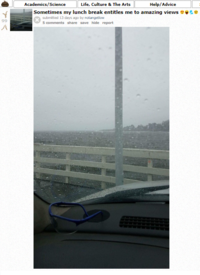Internet Ugly Shop
Form:
For my final project, I will create an online shop called “Beautiful Internet Ugly” (tentative name) that specializes in selling Internet Ugly products. Briefly, this refers to items created on the Internet, largely consisting of image and accompanying text, that look very unaesthetic and are clearly the work of art and design amateurs. These instances of Internet Ugly will be transposed onto relevant objects to be sold on my site. The site will be hosted on an existing e-commerce website such as CafePress, Zazzle or Etsy. It will be divided into different sections including an “About” page introducing people to my site, what it sells and the idea behind its creation. The “Shop” page will display the products themselves, which may include clothing (e.g. t-shirts, shorts) and everyday items (button badges, laptop stickers, water bottles). I will create at least 50 different objects.
Materials
Besides using various class-based readings and experiences to anchor and describe my project, I will use instances of Internet Ugly as detailed in Nick Douglas’s paper “It’s Supposed to Look Like Shit: The Internet Ugly Aesthetic.” These include Nailed it memes [1], the Shitty Food Porn subreddit [2], the ShittyEarthPorn subreddit [3] and other related sources. One example of Internet Ugly is shown as an uploaded image here. My process of creating an Internet Ugly product will involve noting both the image and its caption, and representing both in the final product. A brief description of the image, text and its source will also be provided in the item description.
Relation to course content:
I came up with this idea because I enjoyed our lesson on IRL Lit, specifically the examination of Internet Ugly. I also liked the experience of creating my own post-digital product and finally seeing it in real life. Post-lit, based on our attempted post-lit manifesto [4] refers to a time when lit is already an inextricable, expansive part of our lives. Post-lit practices also appear very much connected to both digital and physical environments, which influence the way we access and consume lit in the post-lit age.
My project aims to facilitate a more deliberate and meaningful redefinition of what lit means in the post-lit age. Internet Ugly reflects “an imposition of messy humanity upon an online world.” It can comprise both text and images and is user-generated (Douglas, 2014). While this does not initially seem like lit, my creation of Internet Ugly products will hopefully highlight how the Internet Ugly is in fact a form of lit, specifically post-lit. Such products comment on the quotidian facets of modern life, and even captions employ literary devices like irony and sarcasm. Their origin on the Internet, with pictures taken from the real world, reflects their status as post-lit due to their interface with both the physical and digital worlds.
My project will also show how, just as we demonstrated in our experiment of creating and ordering our own post-digital products, post-lit can allow us to reflect our personal identities and choices. Douglas mentions that Internet Ugly can be “diluted for use in commercials, products and political agendas.” By creating Internet Ugly for sale online, without any greater political or economic agenda (I don’t expect to gain substantial revenue from this), I avoid diluting the value of Internet Ugly, and instead provide a link between Internet Ugly’s online presence and its potential for real-world usage. Donning t-shirts or carrying water bottles of their favourite examples of Internet Ugly, for instance, may allow people to reflect their own sentiments and personalities. On a broader level, this will reflect how post-lit is so undeniably part of our lives, it is present as part of our self-expression.
